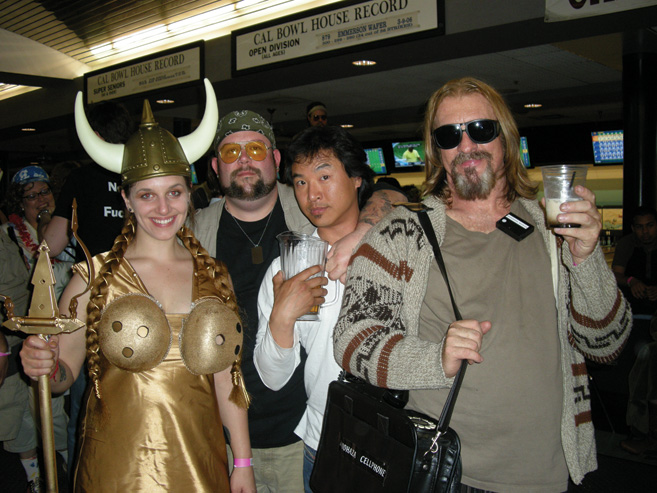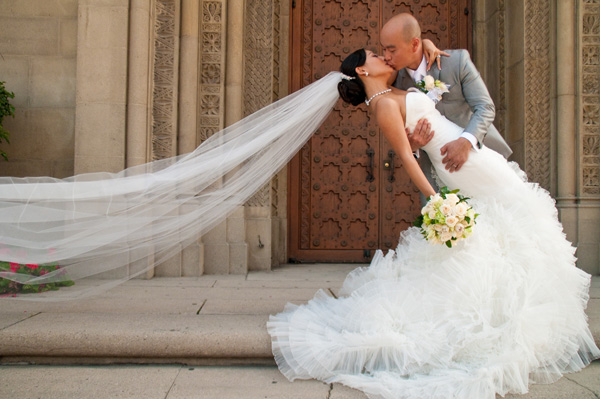 Filmmaker Eddie Chung (second from right) delves into the hype surrounding The Big Lebowski, the 1998 comedy often dubbed as the “first cult film of the internet age.”
Filmmaker Eddie Chung (second from right) delves into the hype surrounding The Big Lebowski, the 1998 comedy often dubbed as the “first cult film of the internet age.”
By John Lee
By design or happenstance, Eddie Chung embarked in 2004 down the circuitous path of an Achiever, the self-dubbed and somewhat incongruous title given aficionados of The Big Lebowski. Responding to a chance invitation to attend an annual Lebowski celebration, Chung, who was familiar with the Coen brothers’ underdog classic film, but not yet the phenomenon, thought a gathering of its off-beat following might make for an interesting subject of inquiry.
Five years down the road, having just completed the 70-minute documentary, The Achievers: The Story Of The Lebowski Fans, Chung, 38, looks back at an extended production run beset with many stony character elements and trippy story twists of the sort that continue to draw legions of enthusiasts.
The Big Lebowski, a comedy released in 1998, was written and directed by Joel and Ethan Coen (Fargo, No Country For Old Men), and starred Jeff Bridges as Jeffrey Lebowski, a slacker and bowler better known as “The Dude.”
Though the film did not generate commercial success, it inspired an event known as “Lebowski Fest,” which got its start in Louisville, Ky., in 2002. Co-founders Scott Shuffitt and Will Russell, who are featured prominently in Chung’s documentary, tell how the annual confab arose out of a desire to escape a dreary workaday existence, while drinking and bowling with like-minded friends. The idea of a festival started as a one-off excuse to watch The Big Lebowski, share a few laughs while reciting lines, perhaps while imbibing the protagonist’s signature White Russians, then rolling some games. Maybe even incorporating trivia and costume contests.
Chung began his quest by interviewing attendees at the 2004 Lebowski Fest, and was transfixed by the moxy they displayed while championing their favorite film. He began prompting festival goers to ponder on camera questions he asked of himself: Why The Big Lebowski? And what force does it hold that brings together all these seemingly disparate people?
From the first festival, which drew, through posted flyers and word of mouth, 150 people, attendance each year has grown exponentially. By the time of Chung’s initiation at the third annual festival, held in Las Vegas (the first gathering to travel beyond Louisville), attendance had reached 1,200. The 2009 Lebowski Fest has since mushroomed into a two-month-long, 12-city “Speed of Sound Tour” that spans the nation. Years past have seen festivals as far flung as London and Edinburgh, and some 40,000 Achievers hailing from the most unlikely reaches of the globe have participated.
Lebowski Fest is a place “where ordinary people become extraordinary,” says Chung, who lives in Palos Verdes Estates, Calif. “They get to the Fest and they get to share the movie. It’s like an inside joke between the fans.” As difficult as it may be to describe in lay terms—the film’s inchoate dialogue, the noir winks to plot (which has been likened to Raymond Chandler’s The Big Sleep), and the devastatingly nonchalant worldview espoused by the titular character—the fact that the film speaks to so many caused Chung to see something remarkable in the Achievers’ ardent devotion.
In dogged pursuit of the Achievers’ stories, Chung’s wandering lens casts its focus upon absurd humanscapes that riff off scenes from The Big Lebowski: Lycra-clad pederast bowling bravado, pacifist taunts, pokes at the Gulf War and post-traumatic Vietnam flashbacks, drug-addled dreamstates, nihilists wailing they’ve been cheated, other plot churning whimsy, and, above all, the uncannily profane and erudite banter expressing a fitting thought at just the right moment, delivered dead-on the mark even when the relevance to plot is uncertain.
“It’s an extraordinary dialogue the characters share,” Chung says. “In film, there’s really never been anything like it.”
Though Chung did not expect that the questions he first raised would require years of seeking and some self-introspection, through the process of making the film, he seems to have found his answers.
“What is the root of their motivation versus the action taken?” Chung posits. “It tells you a lot about people. For me, it was really
interesting watching a guy talk individually about how he loves The Big Lebowski, and how it influenced him on a personal level, then later listening as groups of people said the same sorts of things—very much as a collective group of people who have like-minded ideas. I’d never seen such a singular identity. I think that’s what captured me. Much more so than the fanaticism.”







